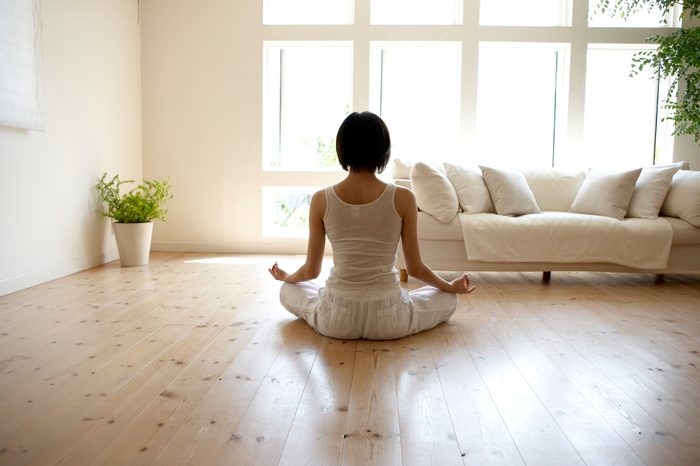How to keep calm
Levelheaded people who never seem frazzled live by these secrets. And you won’t need to rely on strategies to calm down if you can stop yourself from being riled up in the first place. Here’s how you can too.

Calm people go to a happy place in their head
The project is due, but something has gone wrong. Your child’s ‘tude has been especially sassy today. Or maybe the grocery store clerk is just moving too. Darn. Slowly. No matter what the trigger for your stress is, Columbia University clinical psychologist Laura Markham, PhD, recommends summoning a memory that makes you feel calm, secure, and happy. This visualization technique allows stress and tension levels to drop immediately, and any pain you’re feeling in the moment to lessen so that you can stay calm and relaxed. The more you use this technique, the less stressed you’ll get. “As you practice thinking about your happy place again and again, unprocessed memory is now linked to the happy place,” says Markham. “Not only do they keep you from getting frazzled, but they keep you from getting as triggered as often.”

Calm people don’t work as much, but get more done
The relationship between work time and productiveness is not completely linear. Data from the world trade group Organisation for Economic Cooperation and Development shows that more productive workers spend less time at the office: While Greek workers spent almost 2,000 hours a year at work on average, Germans only worked about 1,400 hours, and their productivity was 70 percent higher. Sometimes fewer work hours encourages you to produce higher-quality work. So if you’ve already put in a long day and there’s still more to do, it might be better to pick it back up the next day after some rest. (Here’s how naturally calm people avoid stress.)

Calm people manage nerves by getting excited, rather than relaxed
Have you ever been told to “relax” prior to making a big speech, taking an exam, or performing in some other potentially stressful situation? While calming yourself is definitely a good first step, research in the Journal of Experimental Psychology found that you may perform better if you reappraise your anxiety as excitement. In a study measuring students’ performance on a set of difficult math problems, students who were told to “try to get excited” rather than to remain calm scored significantly higher.

Calm people meditate consistently
When Alex Tew, founder of the meditation website and app Calm, started meditating at age 15, he immediately felt more relaxed during his day-to-day life. But it wasn’t until he made a habit of meditating once every day, even for just a few minutes, that he felt its full effects, he says. “If you build the habit of meditation you’ll be better able to deal with stresses and you’ll be better able to respond,” he says. Consistently setting aside time to be calm every day, even if it’s just doing some deep breathing in the morning before work, helps settle the mind for the rest of the day, Tew says. “If you’re new to meditation, just start with some deep breathing. Take 10 deep breaths in the morning before you leave the house, and just get into that habit of pausing before you rush off into the day.” When you’re stressed later, you’ll be able to handle the situation with a calm mind. Get started with these mini-meditations that banish stress.

Calm people focus on what’s happening in the moment
It’s very easy to let yourself ponder past blunders or worry about the future, but one of the most important mindfulness techniques someone can practice, according to psychotherapist Donald Altman, is “fidelity to the moment.” The real sign of being frazzled is that you’re stuck up in your head, says Altman, author of the books 101 Mindful Ways to Build Resilience and Clearing Emotional Clutter. “You have all these thoughts about the future, and so your head is spinning, and one way to stop that is to drop back into the body. Notice your feet on the floor, take a nice breath,” he says. By participating fully in the present, says Altman, you can change your relationship with what’s happening around you so that you don’t necessarily have to react as strongly to it. That means rather than lashing out automatically or doing something you’ll regret later, you have the ability to choose your response to stress. Check out these other 37 tricks that make stress easier to handle.
